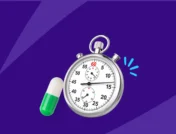Common losartan side effects | Serious side effects | Weight changes | Heart palpitations | Sexual dysfunction | Side effects timeline | Contraindications | Warnings | Interactions | How to avoid side effects | How to treat side effects
Losartan is a generic prescription blood pressure drug prescribed to people with high blood pressure and diabetic kidney disease (diabetic nephropathy). It is also prescribed to prevent strokes in people who have both high blood pressure and left ventricular hypertrophy, a type of heart disease. It is sometimes used off-label to treat heart failure. Also sold under the brand name Cozaar, losartan belongs to a family of drugs called angiotensin II receptor antagonists (or blockers) (ARBs). These drugs widen blood vessels by blocking a hormone called angiotensin that causes blood vessels to constrict and narrow. Compared to some other medications, losartan has few side effects. But, like any prescription drug, side effects are always possible.
Common side effects of losartan
Losartan has relatively few side effects. In studies, upper respiratory infections (colds) were the most common side effect but only occurred in about 8% of patients (versus 7% who were given a placebo). Most other side effects have an incidence of 2% or less, making losartan a highly tolerated drug. Losartan’s most common side effects in people being treated for high blood pressure are:
- Upper respiratory infection (“colds”)
- Feeling dizzy
- Stuffy nose
- Back pain
- Cough
- Muscle pain
- Low blood pressure
- Stomach upset
The most common side effects for people taking losartan for diabetic nephropathy are:
- Diarrhea
- Fatigue
- Low blood sugar
- Low blood pressure
- Elevated potassium levels
- Anemia
- Chest pain
- Weakness
- Back pain
- Urinary tract infection
Serious side effects of losartan
The most serious adverse effects of losartan include:
- Dangerously low blood pressure
- Dangerously high potassium levels
- Kidney impairment
- Kidney failure
- Muscle damage
- Irregular heartbeats (arrhythmias)
- Liver disease
- Blood clotting problems (reduced platelet levels)
- Severe allergic reaction with swelling of the face and throat
Weight changes
Weight changes have not been reported as a side effect of losartan, but some healthcare providers speculate that losartan can help people lose weight. That’s because less than 1% of people taking losartan report a decrease in appetite as a side effect. Because this is a rare side effect of losartan, people should not expect to lose weight when taking losartan unless they adopt a weight-loss diet and exercise regimen.
Heart palpitations
Less than 1% of people taking losartan will experience a heart rate problem (arrhythmia) including atrial fibrillation, ventricular fibrillation, slow heart rate, rapid heart rate, heart block, or a worsening of existing arrhythmias. This doesn’t mean that losartan causes heart problems. In fact, some research shows it can improve heart rate problems when combined with other drugs. However, anyone experiencing fainting, heart fluttering, palpitations, chest pain, or shortness of breath should immediately contact a healthcare professional, no matter what prescription drug they’re taking.
Sexual dysfunction
Sexual dysfunction is only rarely reported in people taking losartan. In fact, losartan may help with sexual dysfunction. In one study, taking losartan improved sexual frequency and satisfaction in both men and women. If, however, you experience a decline in sexual function while taking losartan or any drug, get medical advice from a healthcare professional.
How soon do losartan side effects start?
Losartan’s angiotensin blocking effects begin within a week of starting treatment and peak in three to six weeks. Many common side effects, if experienced, will appear within that time, including dizziness, nasal congestion, muscle pain, chest pain, and dry mouth. Heart rhythm problems, though rare, could also begin shortly after starting losartan. On the other hand, allergic reactions—including severe hypersensitivity reactions—could happen after the very first dose. Other side effects may only occur well after the start of therapy, including infection, back pain, and muscle damage.
How long do losartan side effects last?
The body takes about two hours to break down half a dose of losartan and another six to nine hours to break down its metabolite. It takes between a few hours and two days after taking the last dose for transient side effects to vanish. Most will. Some, like infections of the sinuses and throat, may hang on for a few days. Side effects like high blood potassium or low blood pressure can be resolved by reducing the dose or switching drugs. Sometimes other treatments are also required.. More serious side effects such as muscle damage, kidney failure, or allergic reactions could take more time and treatment to get better.
What are the long-term side effects of losartan?
Some serious but rare side effects such as kidney damage or heart damage may have lifelong consequences. Some people who use losartan over the long term may experience a decline in kidney function. A healthcare provider will check kidney function and other blood tests while taking losartan.
Losartan contraindications
Losartan is a well-tolerated drug, but that doesn’t mean it’s safe for everyone. Losartan can’t be given to people who are allergic to the drug or other ARBs. The risk of a severe allergic reaction is too great. Losartan is also contraindicated in pregnant women, particularly in the second and third trimesters. Losartan can cause severe harm to a fetus, even resulting in fetal death.
Losartan can be given to most adults and children who are 6 years of age and older. It is commonly prescribed to senior citizens, though smaller doses may be used because of age-related decline in kidney function.
As mentioned earlier, losartan is contraindicated in pregnant women during the second and third trimesters. Though not prohibited, healthcare providers generally avoid giving it to mothers who are breastfeeding. It’s unknown whether losartan is present in breast milk, but there are other blood pressure drugs that are considered safer.
Losartan warnings
The FDA has issued a black box warning to discontinue losartan as soon as pregnancy is detected.
Losartan and other ARBs are less effective at lowering blood pressure for Black patients. A healthcare provider may add a diuretic to losartan to reach blood pressure goals. In addition, losartan may not be as effective at reducing the risk of stroke or heart attack for Black patients, and there is a higher risk of severe allergic reactions.
Some medical conditions might be worsened by taking losartan. Extra monitoring is required for people who have:
- Kidney disease or impairment
- Dehydration
- Low sodium
- Liver disease
- Severe congestive heart failure
Losartan is not considered a drug likely to be abused. It does not cause dependence or withdrawal.
As with any prescription drug, an overdose of losartan should be considered a medical emergency. Contact a poison control center or a healthcare professional if too much losartan is taken. Symptoms of an overdose include low blood pressure and a fast heartbeat, though some people may experience a slowed heart rate.
Losartan interactions
Like other prescription drugs, losartan can cause problems when combined with other drugs. The combination could increase the risk of losartan side effects or the side effects of other drugs. These include:
- Nonsteroidal anti-inflammatory drugs (NSAIDs) like ibuprofen and naproxen could damage the kidneys when combined with losartan.
- Aminoglycoside antibiotics, platinum-based chemotherapy drugs, some antiviral drugs, lithium, and cyclosporine are more likely to cause kidney damage when taken with losartan.
- Kidney problems are also more likely when losartan is used with other drugs that also block the renin-angiotensin hormone system. This includes other angiotensin receptor blockers and ACE inhibitors.
- Drugs that increase potassium levels aren’t advised because losartan can raise potassium levels, too. These include potassium-sparing diuretics, NSAIDs, heparin drugs, potassium supplements, and others.
- When combined with other blood pressure drugs, losartan is more likely to cause low blood pressure.
- Drugs that raise blood pressure will interfere with the ability of losartan to reduce blood pressure. These include stimulants, decongestants, ADHD medications, corticosteroids, migraine drugs, and others.
- The antidepressant Marplan (isocarboxazid) and the blood pressure medication aliskiren are never combined with losartan because of the risk of dangerously low blood pressure.
How to avoid losartan side effects
Losartan has few side effects, but that doesn’t mean that everyone is in the clear. There are practical ways to avoid or minimize possible side effects when taking losartan.
1. Inform the prescriber about all medical conditions
Side effects are more likely in people with certain medical conditions. Make sure the prescribing healthcare provider knows about all past and present health conditions, especially:
- Congestive heart failure
- Liver problems
- Kidney problems
- Electrolyte imbalance
- Dehydration
- Vomiting or diarrhea
- Pregnancy or any pregnancy plans
- Breastfeeding
2. Tell the prescriber about medications
Even if a medication or supplement seems unrelated to losartan, make sure the prescribing healthcare provider knows about all prescription and over-the-counter drugs you take. Include supplements and foods that are a normal part of your diet. The prescriber will especially need to know about:
- Blood pressure medications, especially aliskiren
- Diuretics
- NSAIDs
- Potassium supplements
- Salt substitutes that contain potassium
- Marplan (isocarboxazid), an antidepressant
3. Follow all the instructions for taking losartan
Take losartan as instructed. Do not take more or less than prescribed. Losartan doses are taken once or twice per day, so make sure the dosing schedule is understood. If a dose is missed, it can be taken if the next scheduled dose isn’t for a while. If it’s almost time for the next dose, skip the missed dose and take the next dose as scheduled. Never take a double dose for any reason.
3. Drink plenty of fluids
To avoid low blood pressure or elevated potassium, drink plenty of fluids when taking losartan. This is particularly important for people on a low-salt diet or those taking diuretics or laxatives.
4. Avoid NSAIDs
Popular pain-relievers such as aspirin, ibuprofen, or naproxen can harm the kidneys when combined with losartan.
5. Avoid alcohol
Feeling dizzy is one of the common side effects of losartan, so avoid drinking alcohol if dizziness is a problem.
How to treat side effects of losartan
Dizziness
To cope with dizziness, stand up slowly when rising from a sitting or prone position. When upright, move slowly and carefully. Sitting down during a dizziness attack is the best way to avoid falling. Don’t get up until the spinning stops.
Low blood pressure
Feeling lightheaded or dizzy is the most obvious sign of low blood pressure. Make sure to purchase a blood pressure reader to both monitor the effectiveness of losartan treatment and to make sure blood pressure doesn’t drop too low. Dizziness and lightheadedness should be a cue to take a blood pressure reading or contact a healthcare professional for medical advice.
High potassium
High potassium needs to be treated, so contact a healthcare provider if any symptoms of high potassium are experienced such as weakness, nausea, or tingling sensations. High potassium is a medical emergency if a person experiences fluttering, palpitations, heart rate irregularities, inability to move, or chest pain.
Kidney problems
Kidney impairment and kidney damage are among the most serious problems caused by losartan. Contact a healthcare professional immediately at any sign that the kidneys aren’t working as they should:
- An unexplained fall-off in urine volume or frequency
- Painful urination
- Swelling in the extremities
- Sudden weight gain
- Shortness of breath
Sources
- Cozaar prescribing information, U.S. National Library of Medicine
- Losartan, Epocrates
- “Losartan and prevention of atrial fibrillation recurrence in hypertensive patients,” Journal of Cardiovascular Pharmacology
- Losartan potassium drug information, Prescriber’s Digital Reference
- Losartan potassium prescribing information, U.S. National Library of Medicine
- “Sexual dysfunction in hypertensive patients treated with losartan,” American Journal of Medical Science











